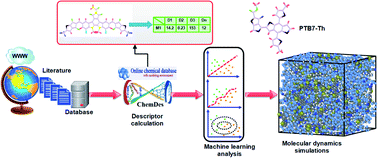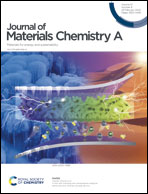Machine learning and molecular dynamics simulation-assisted evolutionary design and discovery pipeline to screen efficient small molecule acceptors for PTB7-Th-based organic solar cells with over 15% efficiency†
Abstract
Organic solar cells are the most promising candidates for future commercialization. This goal can be quickly achieved by designing new materials and predicting their performance without experimentation to reduce the number of potential targets. We introduce a multidimensional design and discovery pipeline to systematize materials discovery and reduce the dependence on a serendipitous approach. Machine learning models are trained on data collected from the literature for the prediction of various properties, such energy levels (HOMO and LUMO), UV/visible absorption maxima (both in solution and film) and power conversion efficiency (PCE). More than 5000 new small molecule acceptors (SMAs) are designed using easily synthesizable building blocks. 1700 small molecule acceptors without a suitable energy level match with PBT7-Th are filtered off. SMAs with blue-shifted absorption maxima are not further considered. The number of SMAs was reduced to 2350 on the basis of the predicted UV/visible absorption maxima. Then, the SMAs were further screened on the basis of the predicted power conversion efficiency (PCE). More than 100 SMAs with PCE >13% were selected and further studied using molecular dynamics (MD) simulations. The mixing behavior of the PBT7-Th:SMA blends was studied using the Flory–Huggins parameter. 15 SMAs that exhibited balanced mixing with PBT7-Th were selected. Finally, the best predicted PCE is over 15% with the common IDTT core, which is far better than that of reported results. This is an effective pipeline to design and screen potential materials without revisiting the previous experimental work, and thus will pave the way to cost- and time-efficient discovery of novel materials.

- This article is part of the themed collections: Machine Learning and Artificial Intelligence: A cross-journal collection, 2023 Journal of Materials Chemistry A Lunar New Year collection and 2022 Journal of Materials Chemistry A Most Popular Articles


 Please wait while we load your content...
Please wait while we load your content...